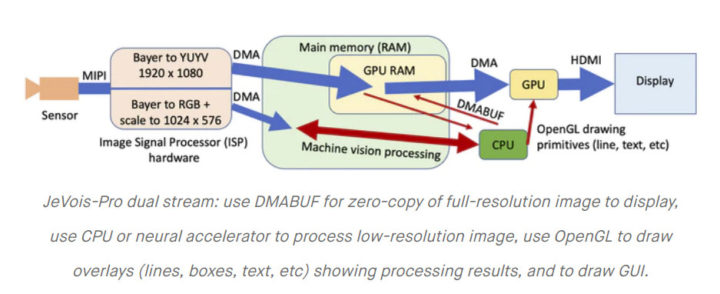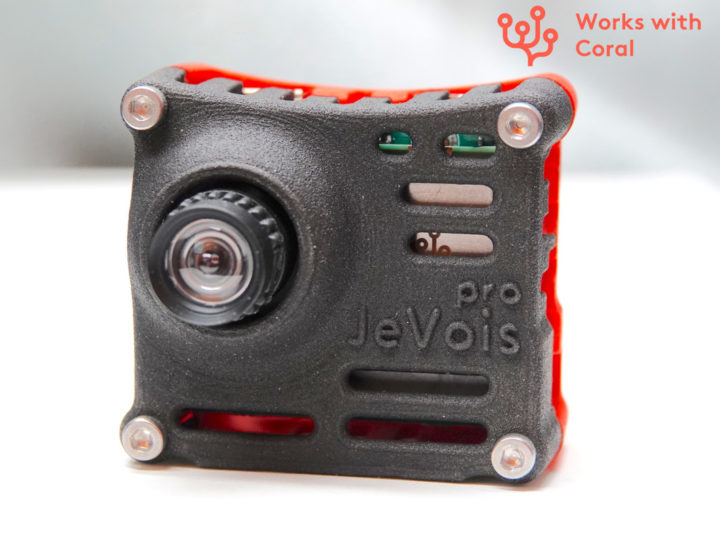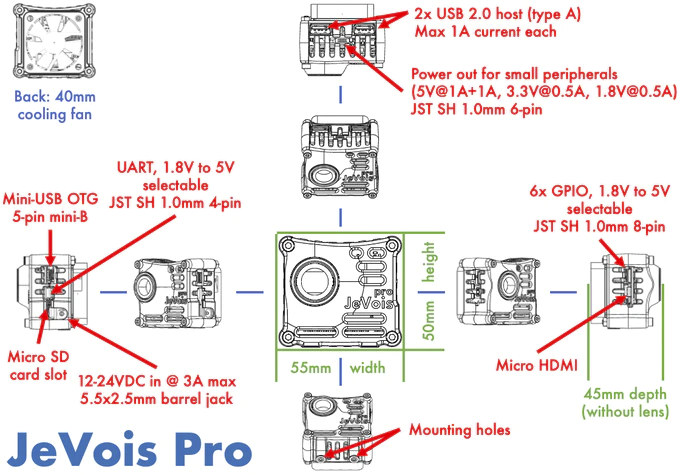Jevois-A33 smart camera was a tiny Linux camera with Allwinner A33 processor designed for computer vision applications and announced in 2016. I had the opportunity to review the computer vision camera the following year, and it was fun to use to learn about computer vision with many examples, but since it relied on the CPU for processing, it would not have been suitable for all projects due to the lag, as for example, object detection took 500ms and Yolo V3 around 3 seconds per inference.
But time has passed, and great progress has been made in the computer vision and AI fields with the tasks now usually handled by a built-in NPU, or an AI accelerator card. So JeVois Pro deep learning camera has just been launched with an Amlogic A311D processor featuring a 5 TOPS NPU, and support for up to 13 TOPS via a Myriad X or Google Edge TPU M.2 card.
- SoC- Amlogic A311D hexa-core processor with 4x Cortex-A73 core @ 2.2 GHz, 2x Cortex-A53 cores @ 1.8 GHz, a quad-core Mali G52 MP4 GPU @ 800 MHz, and a 5 TOPS Neural Processing Unit (NPU).
- System Memory – 4 GB LPDDR4-3200
- Storage – MicroSD card slot for the operating system, software, and data.
- Camera
- Built-in 2MP Sony IMX290 back-illuminated Starvis sensor, 1/2.8”, 12mm lens, 1920×1080 at up to 120fps, rolling shutter, wide dynamic range support.
- Custom camera sensor connector, supports 1 or 2 sensors, 4x MIPI-CSI + IMU.
- Video & audio output – HDMI 2.1 up to 4k @ 60 Hz.
- USB – 2x USB 2.0 ports, 1x mini USB OTG port
- Sensor – TDK InvenSense ICM-20948 with 3-axis accelerometer, 3-axis gyro, 3-axis compass, connected over SPI bus @ 7 MHz, can be synchronized with the camera sensor.
- Expansion
- M.2 E-Key slot for 2230 PCIe x1/USB/SDIO/PCM/UART add-on cards (Coral TPU, WiFi, etc), supports custom JeVois extension for eMMC flash. (Note: PCIe x2 not supported).
- 8-pin GPIO port (I2C + SPI, or 6x GPIO + GND + I/O voltage select).
- Debugging – 4-pin UART (serial console) port.
- Power Supply
- Input – Single 6-24 VDC input via DC jack up to 30 Watts
- 6-pin auxiliary power out for 5V, 3.3V, and 1.8V peripherals.
- Power consumption
- Idle: 3W
- YOLOv2 on NPU: 5.3 Watts
- Running CPU+NPU+TPU+VPU quad YOLO/SSD demo as shown in the video below: 12 Watts.
- Dimensions – 50 x 50 x 45 mm without lens
- Weight – 80 grams with case, fan, heatsinks. Electronics only: 40 grams
The AI camera runs Ubuntu 20.04 LTS aarch64 full with the following software packages:
- OpenCV (latest) + OpenVino + all contribs and Python bindings preinstalled.
- JeVois Core library with 30+ included machine vision modules preinstalled (OpenCV demos, QR Code recognition, object detection, person/face detection, object tracking, dice pips counting, etc..)
- OpenGL ES 3.2, Vulkan 1.0, OpenCL 2.0, Coral Edge-TPU libraries.
- Python 3.8 + numpy + scipy pre-installed.
- Boost, Eigen, ImGui, glm, and many other C++ libraries pre-installed.
The Amlogic A311D camera is compatible TensorFlow-Lite 2.5, Caffe, ONNX, MxNet, and Darknet deep learning frameworks. Besides the preinstalled machine vision modules, it’s also possible to import/design your own custom deep learning models to run inside JeVois-Pro using machine vision pipelines in C++ or Python. Software development and testing can be first performed on a Linux computer, before cross-compiling the program for the JeVois Pro camera.

JeVois Pro is an open-source project, and all resources including software and hardware schematics will be released once the crowdfunding campaign is over. Development progress can be followed on JeVois documentation website, where you can also access documentation for the earlier JeVois-A33 camera.
JeVois launched the new Pro camera on Kickstarter with a $60,000 funding target. Rewards start at $379 for the Starter Kit with the camera, a 64GB MicroSD card, a micro HDMI to HDMI adapter, a GPIO cable, and a Coral Edge TPU card for up to 9 TOPS of combined AI processing power. The only other reward is a pack of three JeVois Pro Starter Kits for $999. Shipping is free to the US but adds $39 to the rest of the world. Backers should expect their perk(s) to ship in September 2021 barring any delays. Note that 13 TOPS is only achievable with a dual Google Edge TPU M.2 module that is not offered in the Kickstarter campaign.

Jean-Luc started CNX Software in 2010 as a part-time endeavor, before quitting his job as a software engineering manager, and starting to write daily news, and reviews full time later in 2011.
Support CNX Software! Donate via cryptocurrencies, become a Patron on Patreon, or purchase goods on Amazon or Aliexpress






